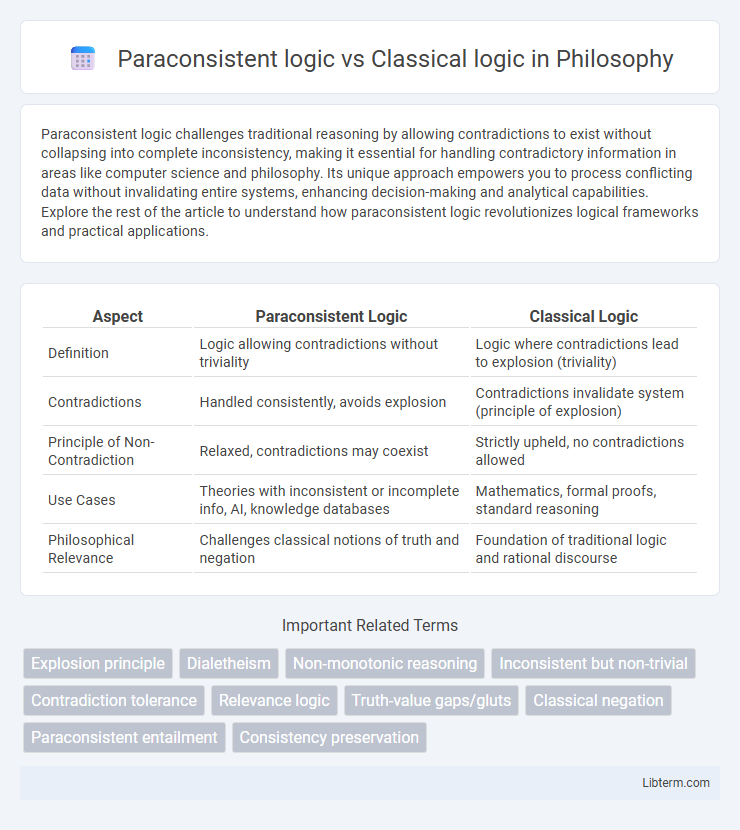Paraconsistent logic challenges traditional reasoning by allowing contradictions to exist without collapsing into complete inconsistency, making it essential for handling contradictory information in areas like computer science and philosophy. Its unique approach empowers you to process conflicting data without invalidating entire systems, enhancing decision-making and analytical capabilities. Explore the rest of the article to understand how paraconsistent logic revolutionizes logical frameworks and practical applications.
Table of Comparison
| Aspect | Paraconsistent Logic | Classical Logic |
|---|---|---|
| Definition | Logic allowing contradictions without triviality | Logic where contradictions lead to explosion (triviality) |
| Contradictions | Handled consistently, avoids explosion | Contradictions invalidate system (principle of explosion) |
| Principle of Non-Contradiction | Relaxed, contradictions may coexist | Strictly upheld, no contradictions allowed |
| Use Cases | Theories with inconsistent or incomplete info, AI, knowledge databases | Mathematics, formal proofs, standard reasoning |
| Philosophical Relevance | Challenges classical notions of truth and negation | Foundation of traditional logic and rational discourse |
Introduction to Paraconsistent and Classical Logic
Paraconsistent logic challenges the principle of explosion in classical logic by allowing contradictory information to coexist without collapsing the entire logical system. Classical logic adheres strictly to bivalence and non-contradiction, where any contradiction entails every statement becoming true. Paraconsistent logic finds applications in areas like knowledge bases and legal reasoning, where inconsistencies are inevitable but must be managed logically.
Historical Background and Development
Paraconsistent logic emerged in the mid-20th century as a response to the limitations of classical logic, which adheres strictly to the law of non-contradiction, thereby rejecting any contradictory statements. Developed primarily by philosophers and logicians such as Newton da Costa and Graham Priest, paraconsistent logic allows for the controlled handling of contradictions without collapsing into triviality, addressing inconsistencies found in mathematical theories and real-world reasoning. Classical logic's roots trace back to Aristotle, emphasizing bivalence and consistency, whereas paraconsistent logic represents a paradigm shift aiming to formalize reasoning in inconsistent but non-trivial systems.
Core Principles of Classical Logic
Classical logic is founded on the principles of bivalence, where every proposition is either true or false, and the law of non-contradiction, which rejects any statement being both true and false simultaneously. It adheres strictly to the principle of excluded middle, asserting that for any proposition, either that proposition or its negation must be true. This framework underpins classical deductive reasoning, ensuring consistency and unambiguous truth values in formal systems.
Key Concepts in Paraconsistent Logic
Paraconsistent logic challenges the principle of explosion in classical logic by allowing contradictions to exist without entailing every statement, thereby enabling reasoning in inconsistent but non-trivial systems. Key concepts include the rejection of the law of non-contradiction and the introduction of dialetheism, where some contradictions are true. This logic framework supports applications in areas such as database theory, artificial intelligence, and knowledge representation, where inconsistent information is common and must be handled rigorously.
Handling Contradictions: Paraconsistent vs Classical Approaches
Paraconsistent logic allows for the coexistence of contradictory statements without collapsing into triviality, enabling reasoning in situations where inconsistencies are present. Classical logic, by contrast, follows the principle of explosion, where any contradiction leads to every statement being provable, thereby rendering the system trivial and unusable in the presence of contradictions. Paraconsistent frameworks are essential for applications requiring robust handling of contradictory information, such as knowledge bases and certain computational systems.
Applications and Use Cases
Paraconsistent logic is essential in fields like artificial intelligence, knowledge representation, and database management where handling inconsistent or contradictory information without collapse into triviality is critical. Classical logic underpins traditional mathematical proofs, algorithm design, and formal verification systems, relying on strict adherence to the law of non-contradiction and explosion principle. Paraconsistent logic's tolerance for contradictions enables more robust reasoning in real-world scenarios such as legal reasoning, fault-tolerant systems, and uncertain knowledge bases, contrasting with classical logic's precision and consistency demands.
Strengths and Limitations of Each Logic
Paraconsistent logic excels in handling contradictory information without collapsing into triviality, making it ideal for inconsistent databases and reasoning in uncertain environments. Classical logic offers a robust framework with well-defined inference rules and widespread applicability in mathematical proofs and formal verification, but it fails when contradictions arise, leading to explosive results. While paraconsistent logic sacrifices some classical inference laws to maintain consistency, classical logic maintains strict consistency requirements that limit its use in real-world scenarios involving conflicting data.
Philosophical Implications
Paraconsistent logic challenges the classical logic principle of non-contradiction by allowing contradictory statements to coexist without logical explosion, profoundly impacting metaphysical and epistemological assumptions. This approach supports more nuanced reasoning about reality's inherent inconsistencies, influencing debates in philosophy of science, ontology, and ethics. By rejecting classical bivalence, paraconsistent logic opens avenues for alternative truth frameworks that better accommodate paradoxes and complex phenomena.
Real-World Examples and Case Studies
Paraconsistent logic enables reasoning in situations involving contradictory but non-trivial information, such as in legal systems where conflicting laws coexist without leading to complete inconsistency. Classical logic, by contrast, cannot handle contradictions effectively, often resulting in explosion where any statement can be derived once a contradiction is present. Case studies in medical diagnostics illustrate the advantage of paraconsistent logic by allowing simultaneous consideration of conflicting test results without invalidating the entire diagnostic process.
Future Directions and Research Trends
Paraconsistent logic, which tolerates contradictions without trivialization, is gaining traction in areas like artificial intelligence, knowledge representation, and automated reasoning, contrasting with Classical logic's strict consistency requirement. Future research trends emphasize integrating paraconsistent methods with quantum computing, fuzzy logic, and neural networks to address real-world uncertainty and inconsistent data. Advances in tool development and hybrid logical frameworks are driving efforts to enhance computational efficiency and practical applications in complex decision-making systems.
Paraconsistent logic Infographic

 libterm.com
libterm.com